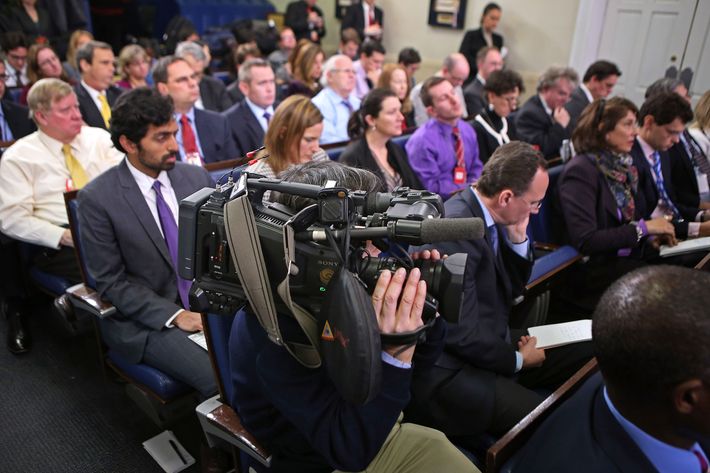
The debt-ceiling showdown has snuck up quietly on Washington and is barely registering in the broader economy. Nobody is quite sure what to make of it. A familiar Washington Kabuki dance? A white-knuckle bond market tightrope walk? A final reactionary howl at the onset of Obamacare? It may be these things, but it’s also something much larger: a Constitutional struggle, a kind of quasi-impeachment, that will test Obama’s mettle and, next to his reelection campaign, poses the most singular threat to his presidency.
The progression of events begins with a dynamic I described in a print piece at the beginning of 2012 – conservatives had come to regard the 2012 race as their last chance to win an election as authentic conservatives against a rising Democratic majority. Since their crushing defeat, they have ignored the task of refurbishing the party’s national appeal for its next national electoral bid, and instead have recommitted themselves to waging increasingly millenarian confrontations from their existing red state power base in Congress.
Most of us expected, at some level, that the election would cool the right’s apocalyptic fervor. Instead, the opposite has occurred. Paul Ryan candidly explained the calculation: “The reason this debt limit fight is different is, we don’t have an election around the corner where we feel we are going to win and fix it ourselves. We are stuck with this government another three years.” This is a remarkable confession. Republicans need to compel Obama to accept their agenda, not in spite of the fact that the voters rejected it at the polls but precisely for that reason.

The exhaustion of electoral channels against Obama has spurred the party to seize power through non-electoral channels. Their opening demand that Obama sign Mitt Romney’s entire economic plan into law in return for avoiding a debt default, while historically bizarre, followed perfectly from their legislative strategy this year.
House Republicans decided back in January to boycott any negotiations with Obama over fiscal policy. They presented this at the time as a desire to return to “regular order,” with negotiations between the House and Senate, but eventually decided to boycott those, too. The entire House Republican strategy is premised on using threats to leverage unilateral concessions from the Democrats.
Their aversion to compromise has been accepted as settled fact in Washington, reimagined not only as a new normal but as the way it’s always been. Republican Dana Rohrabacher defended the use of debt-ceiling threats to pry concessions from Obama like so: “People have to recognize there’s never any compromise until the stakes are high. In our society, that’s the nature of democratic government.” That is completely false. American political parties have forged compromises for decades without high-stakes threats to bring them to the table. Not to mention the fact that, by “compromise,” Rohrabacher means unilateral concessions by the president.
Part of the confusion is that the debt ceiling used to be an opportunity for the opposing party to denounce the fiscal irresponsibility of the president. On occasion, but not usually, debt-ceiling hikes have been appended onto budget agreements that were negotiated on their own terms. What’s completely novel is Congress using the threat of a debt default to force the president to make unilateral policy concessions. The conventions of he-said, she-said journalism have allowed this radical development to insinuate itself into the routine backdrop of partisan squabbling.
Neutral parties have likewise come to accept the hostage-taking threat of the debt ceiling as merely a normal form of political negotiation. Time reporter Zeke Miller asserts, “Hostage taking — by promising harm if you do not get your way — has long been a standard way of doing business in Washington,” pointing to Democratic threats to let the Bush tax cuts expire or to change Senate rules as an analogue.

But these examples lack any of the relevant hostage-taking qualities that sets apart the debt ceiling threat. One is the scale and irreversible impact of a debt ceiling breach – unlike the failure of a bill, or even a government shutdown, which can be reversed. Second, and more importantly, it’s normal in any negotiation for each party to have a walk-away threshold to stop something they consider objectionable. Democrats, in the cases Miller cites, were objecting to outcomes – full extension of the Bush tax cuts, continued filibustering of executive appointments – that they defined as unacceptable. House Republicans, by contrast, don’t object to raising the debt ceiling. They concede it’s necessary to avoid disaster!
The hostage dynamic of the debt-ceiling fight has created a dangerous, historically unusual set of circumstances. One aspect of it is to set up a precarious, high-stakes negotiation, the failure of which could set off large, immediate, and irreversible damage. The second is to reset the balance of power between the president and Congress, allowing the latter to compel the former to submit to its agenda without concessions. Both these changes would permanently and dangerously alter the character of American government.
If outsiders have failed to grasp the motivations of the House Republicans, puzzling at their odd redoubling of ideological fervor since November, they have likewise mistaken Obama. Everything I have seen from Obama suggests he understands that he cannot repeat his blunder of 2011, when he mistook the GOP’s debt-ceiling threat for an invitation to engage in normal fiscal bargaining.

Obama can’t tame the monster he created gradually; he has to kill it completely. Bargaining his way through this crisis would do Obama no good, even if he could get through it by offering up a meager or even symbolic concession. Anything that allows Republicans to believe they can trade a debt-ceiling threat for policy concessions simply creates a new hostage crisis the next time the debt ceiling comes up. This negotiation is Obama’s only chance to halt the routinization of debt-ceiling extortion.
Obama’s incentive structure is simple, then: Allowing Republicans to default on the debt now is better than trading something that allows them to threaten it later. His best option is to refuse to negotiate the debt ceiling and have the House raise it before October 17. His next best option is to refuse to negotiate the debt ceiling, allow default, and never have to go through it again. Bargaining merely postpones, and worsens, the next default crisis. No negotiated debt-ceiling price is small enough to be acceptable. There is therefore no circumstance under which bargaining for a debt-ceiling hike makes sense, even if the alternative is certain default.
That is a frightening reality, made all the more frightening by two additional factors. The first is that Republicans don’t believe Obama’s insistence that he won’t negotiate. Obama can claim he won’t negotiate, but he would have an incentive to lie about this, and nobody other than Obama can really know for sure. (I believe him, but I wouldn’t bet my life on it.) And one of the things Republicans truly believe about Obama — they say it constantly in private — is that they can make him fold.
As the debt-ceiling deadline ticks toward midnight, Obama ought to be able to make his determination clear enough that House Republican leaders understand their only choices are to raise the debt ceiling or breach it. Default would risk not only economic calamity but the potential of an electoral one for the otherwise unassailable Republican majority. But history is replete with disastrous miscalculations. They’re often made by weak, short-sighted leaders facing pressure to demonstrate toughness from internal opponents. That is to say, Boehner is exactly the kind of leader who would blunder into a calamity like a debt default.
Yet Obama simply has no alternative but to accept that risk. The stakes are higher than resisting the specific demands Republicans are making, and higher even than the economic havoc of a debt breach. Obama is fighting to save his presidency.






























